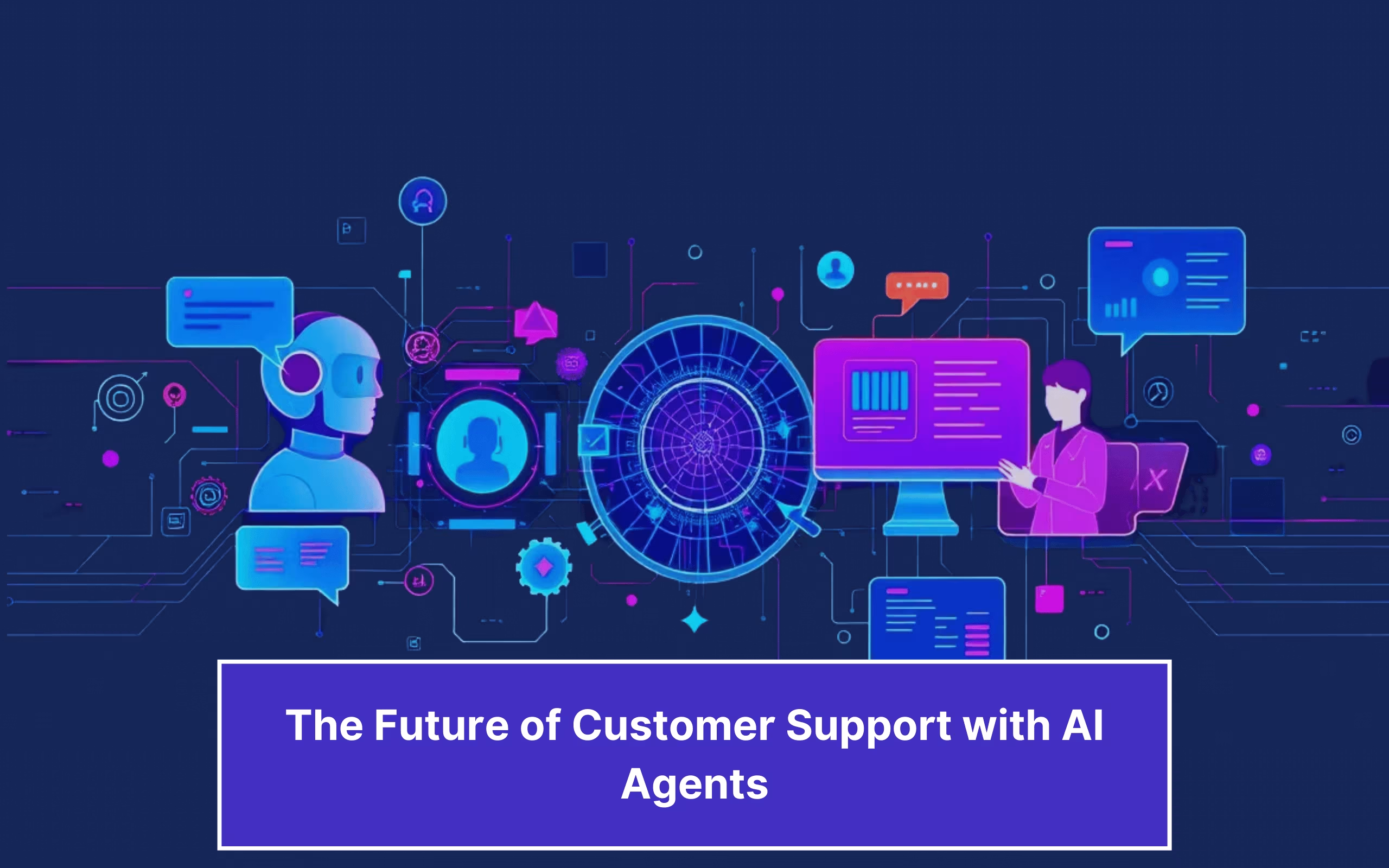Updated on February 12, 2025
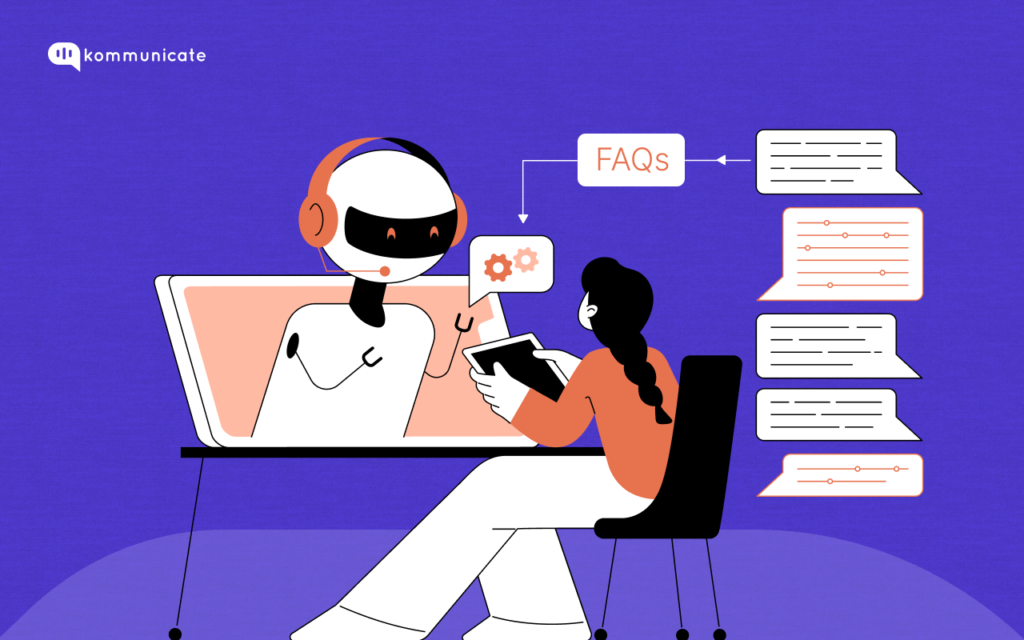
Imagine a customer visiting your website for the first time and instantly greeted by a friendly virtual assistant, ready to answer any of their questions and guide them toward a purchase. There is no waiting, no calls put on hold, or no navigating confusing menus — just quick, efficient, and personalized service.
This, my friends, is the work of a FAQ chatbot.
In this blog:
- What is an FAQ chatbot?
- Types of FAQ chatbot
- Benefits of Using FAQ chatbot
- How to choose the best FAQ chatbot for business
- Build FAQ chatbot
- FAQ chatbot Use cases
- Conclusion
- Frequently Asked Questions(FAQs)
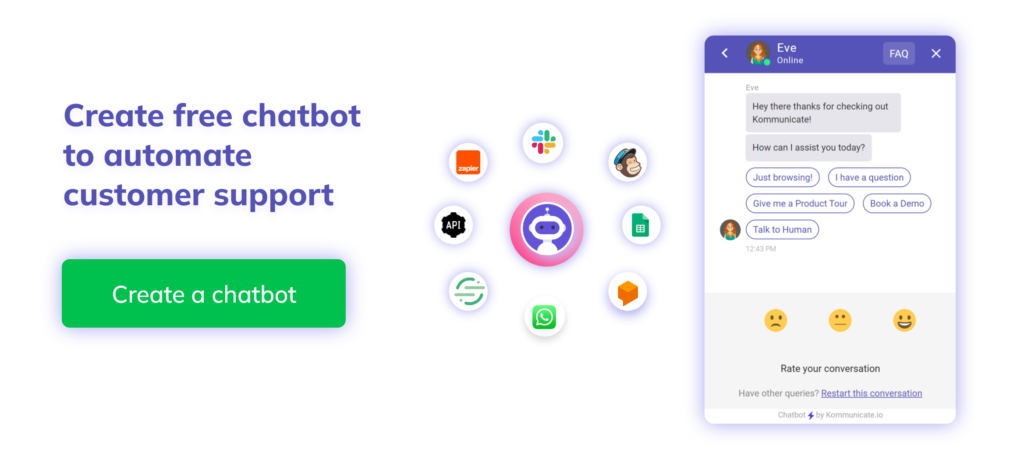
What is an FAQ chatbot?
An FAQ chatbot, short for Frequently Asked Questions chatbot, is a conversational AI designed to answer common questions from users naturally and engagingly. They are increasingly used by businesses and organizations to provide 24/7 customer support, reduce the workload on human agents, and improve user experience. These chatbots are fed with large datasets ranging from product documentation to customer support materials, these intelligent bots offer a game-changing approach to customer interaction.
FAQ chatbots answer your questions like an FAQ page but use AI for a smarter, faster experience.
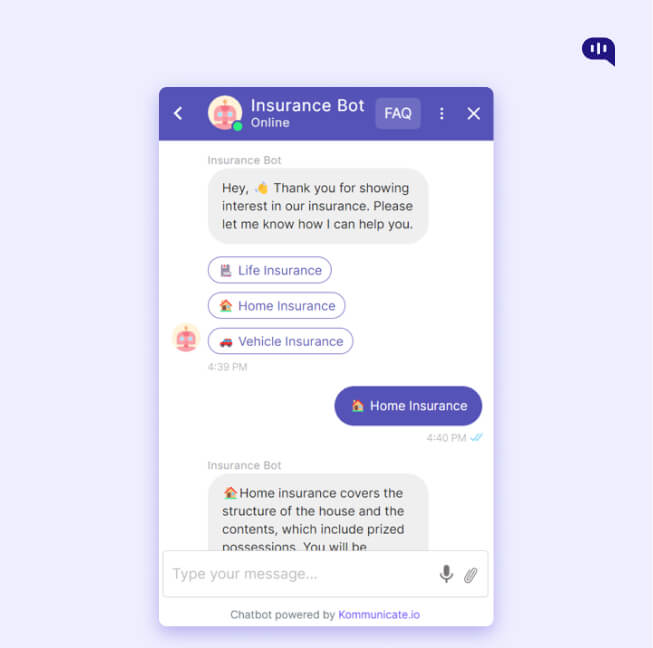
If you want to read more about building a FAQ chatbot for different platforms or integrating third-party FAQs into your chatbot, read these articles:
- Convert your Salesforce FAQ into a Chatbot
- How to Build an FAQ Chatbot Using Nodejs
- How To Create FAQ Chatbot For WhatsApp
- How to Create FAQ Bot Using Dialogflow Knowledge Base Connector
Types of FAQ chatbot
While the term “FAQ chatbot” may seem singular, the reality is far more diverse. Just like choosing the right tool for the job, selecting the optimal chatbot type hinges on understanding their distinct capabilities and limitations. Let’s dive into the intricate landscape of FAQ chatbots, uncovering the strengths and weaknesses of each breed.
Rule-Based Bots
Rule-based bots, also known as decision-tree bots or conversational agents, are a type of chatbot that relies on a set of pre-defined rules to understand and respond to user queries. They work similarly to a flowchart, where each user input triggers a specific response based on the rules programmed into the bot.
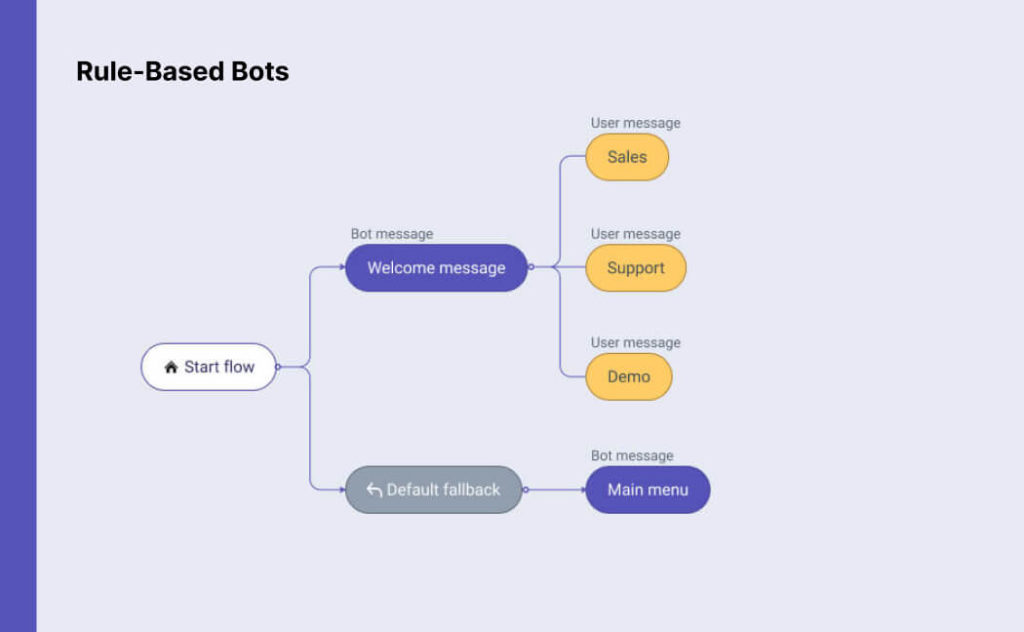
Benefits of Rule-Based Bots
- High Accuracy
- Easy to Develop
- Transparency
- Cost-Effective:
Rule-Based Bots Limitation
- Limited Flexibility
- No Learning
- Scalability Challenges:
Keywords-Matching Bots
Keywords-matching bots are a type of chatbot that relies heavily on matching user input to predefined keywords and phrases to respond. They are a subset of the broader category of rule-based bots, focusing specifically on keyword recognition as their primary decision-making mechanism.
Benefits of Keywords-Matching Bots
- Simple and Quick to Develop
- High Accuracy for Simple Tasks
- Easy to Maintain
- Cost-Effective
Keywords-Matching Bots Limitation
- Potential misinterpretations
- No Context Awareness
- Less Personalization
NLP Bots
NLP Bots, or Natural Language Processing Bots, is a type of AI chatbot that utilizes natural language processing technology to understand and respond to human language in a more comprehensive and nuanced way than traditional chatbots.
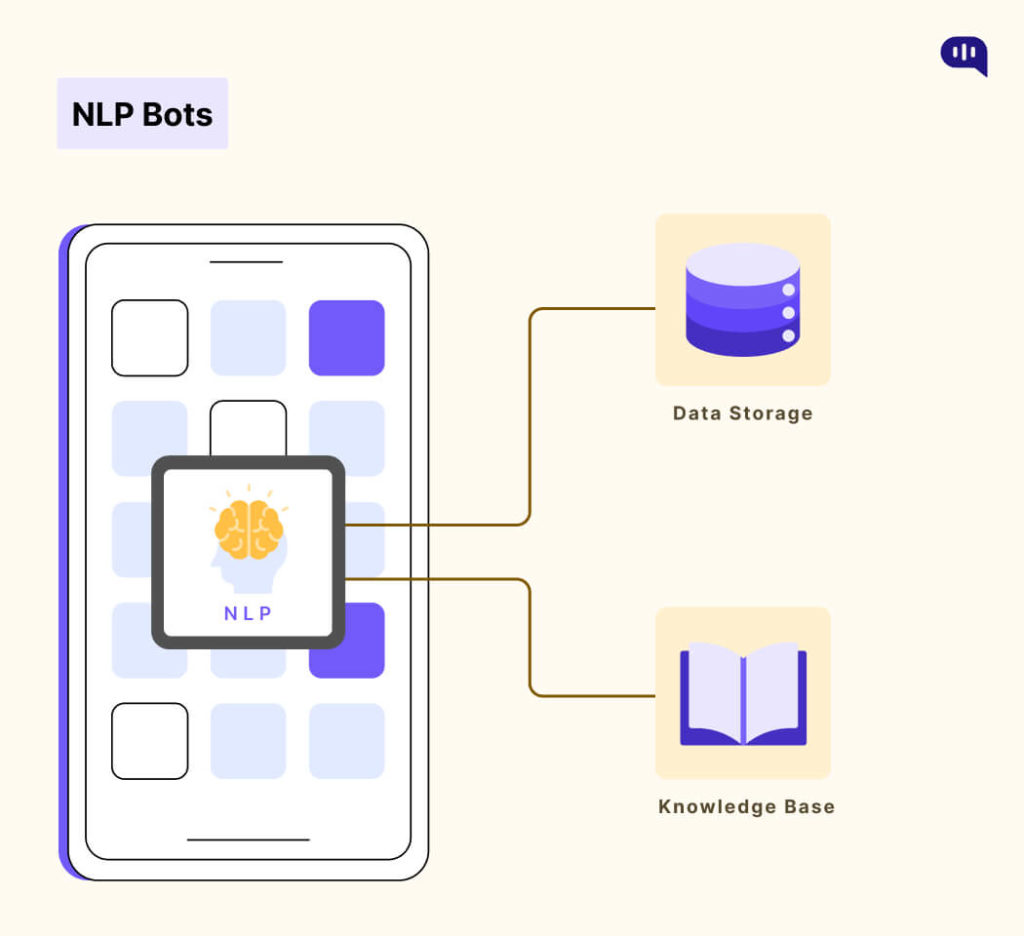
Benefits of NLP Bots
- Highly flexible
- Handle complex questions
- Personalized responses
NLP Bots Limitation
- More complex to build and maintain
- Potential misinterpretations
Hybrid Bot
Hybrid bots are a combination of rule-based chatbots and AI-powered chatbots to create a more powerful and versatile conversational interface.
Benefits of Hybrid Bots
- Optimal flexibility and accuracy
- Handle diverse queries efficiently
- personalize interactions
Hybrid Bots Limitation
- Complex design and integration
- High maintenance.
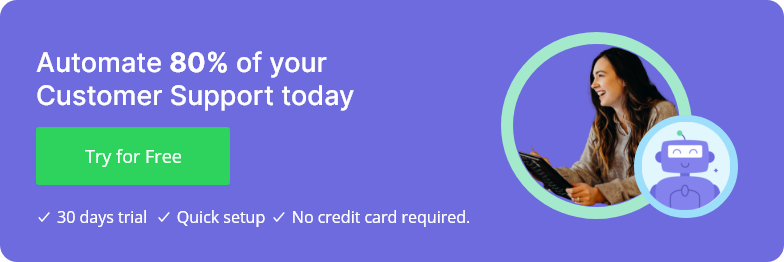
FAQ Chatbot Types: A Quick Table Comparison
| Type | Function | Strengths | Weaknesses | Ideal for |
| Rule-Based Bots | Follow pre-defined paths based on keywords and user choices. | Simple to deploy and maintain, predictable responses. | Limited flexibility, and repetitive interactions. | Businesses with clearly defined FAQs and standardized processes. |
| Keyword-Matching Bots | Scan user queries for relevant keywords and match them to pre-loaded responses. | More versatile than rule-based bots, it handles a wider range of questions. | Potential misinterpretations, risk of dead ends, less personalized. | Businesses with diverse FAQs, dynamic content, and a need for adaptability. |
| NLP Bots | Analyze the meaning and context of user queries with natural language processing, offering conversational interactions. | Highly flexible and versatile, handle complex questions and personalized responses. | More complex to build and maintain, causing potential misinterpretations. | Businesses seeking personalized experiences, to deal with complex inquiries, or prioritizing continuous improvement. |
| Hybrid Bots | Combine rule-based structures for common questions and NLP for complex inquiries. | Optimal flexibility and accuracy, handle diverse queries efficiently, and personalize interactions. | Requires careful design and integration, and higher maintenance. | Businesses with a mix of straightforward and complex FAQs, seeking efficiency and personalization. |
Related reading: All the types of chatbots you should know about
According to SuperOffice, 81% of organizations already cite CX as a competitive differentiator. However, delivering exceptional CX is a complex challenge that most organizations are grappling with. They are confronted by several challenges like limited resources and volatile customer expectations that make it difficult to create a foolproof CX strategy.
Benefits of using FAQ Chatbot
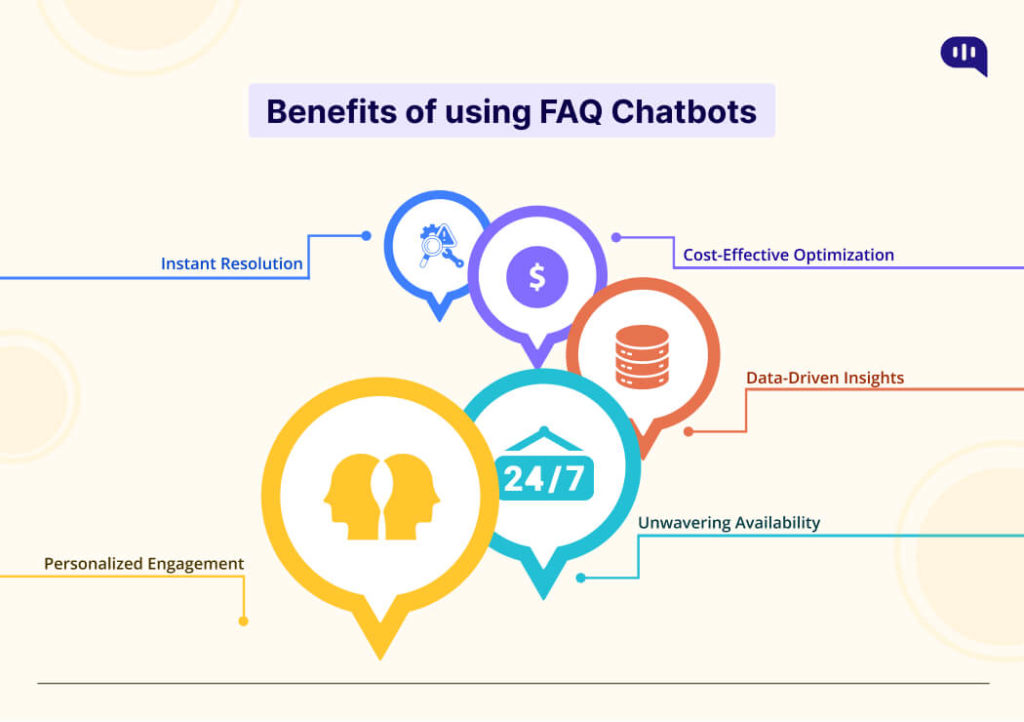
However, FAQ chatbots can prove to be a potent ally in the pursuit of customer experience excellence through automation. Here is how they can help:
- Instant Resolution: FAQ chatbots provide real-time responses to frequently asked questions. They are available round the clock 24/7/365, ensuring customer satisfaction and maximizing operational efficiency.
- Personalized Engagement: The days of robotic, generic interactions are now obsolete. FAQ chatbots leverage advanced technology to analyze user behavior and personalize responses, fostering trust and brand loyalty.
- Cost-Effective Optimization: Human customer service is invaluable but resource-intensive. FAQ chatbots are capable of handling high-volume inquiries efficiently, freeing up agents to tackle complex issues that demand their cognition and attention.
- Data-Driven Insights: Every interaction that chatbots have with customers can be used to capture valuable data. It could be about user needs and pain points, enabling you to refine your customer experience strategy, products, and overall CX strategy.
- Unwavering Availability: Unlike human agents with limitations, FAQ chatbots offer consistent, around-the-clock support. Customers receive prompt assistance regardless of location or time zone, building trust and positive brand perception.
Automate customer queries, streamline support workflows, and boost efficiency with AI-driven email ticketing from Kommunicate!Beyond these core benefits, FAQ chatbot unlock a wealth of additional advantages:
- Increased Sales and Conversions: By streamlining the customer support process, FAQ chatbots can guide customers toward purchases, boosting your bottom line.
- Enhanced Brand Reputation: Positive interactions with your FAQ chatbot translate into positive referral business and an emboldened brand image, leading to new business
- Reduced Customer Churn: Unresolved frustrations lead to abandoned relationships. FAQ chatbots are capable of addressing customer queries in real time before customers reach a point of no return. They actively help reduce churn and in fostering long-term customer loyalty.
All said, investing in an FAQ chatbot isn’t simply about acquiring technology; it’s about embracing a customer-centric philosophy.
Things to consider when choosing the best FAQ chatbot for your Business
Selecting the perfect FAQ chatbot for your business should be a thoughtful decision. The ideal solution hinges on your specific needs and goals. Here are some key factors to ponder:
1. Define Your Purpose:
- What tasks do you want your chatbot to handle? Simple FAQs, complex problem-solving, lead generation, or even scheduling appointments?
- What channels will it operate on?
- Do you want it to integrate with your existing tech stack?
2. Consider Capabilities and Features:
- Types of chatbots: Rule-based, keyword-matching, NLP-powered, or a hybrid? Each offers varying flexibility and complexity.
- Level of personalization: Can it dynamically adapt responses based on user behavior and context?
- Multilingual capabilities: Does it cater to your diverse customer base?
- Reporting and analytics: Can you track chatbot performance and user interactions?
- Ease of use and customization: Can you build and modify the chatbot without extensive technical expertise?
3. Budget and Pricing:
- Subscription-based model, one-time fee, or per-user fees?
- Hidden costs for additional features or customizations?
- Does the cost align with the value the chatbot offers your business?
4. Security and Privacy:
- How does the chatbot handle sensitive customer data?
- Does it comply with applicable data privacy regulations?
- How does it stack up against cyber threats?
5. Customer Support and Training:
- Does the chatbot provider offer adequate support and training resources?
- Is there a community or forum for user assistance and knowledge sharing?
6. Scalability and Future Proofness:
- Can the chatbot easily adapt to changes in your business and customer needs?
- Is the technology future-proof?
Be informed that no one chatbot can serve all kinds of businesses. It is necessary to take into account all factors and align your chatbot with your business needs. That is the only surefire way to unlock the true potential of FAQ chatbots.
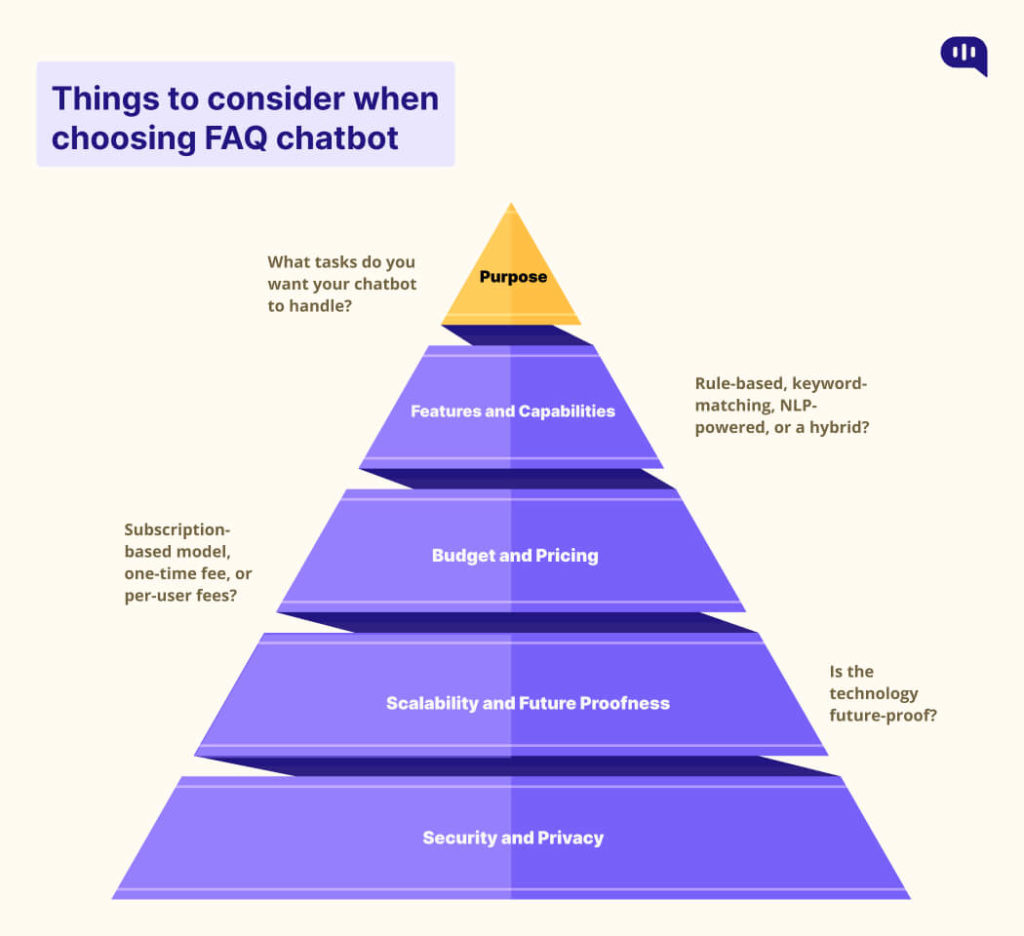
How to Create a FAQ chatbot?
Building a stellar FAQ chatbot that delights your customers and optimizes your operations requires dedication to best practices across various aspects. Here are some key areas to focus on:
1. Content and Knowledge Base:
- Start with FAQs: Identify recurring FAQs and prioritize building responses for them.
- Use clear and concise language: Use shorter and concise sentences that sound human. They should be informative and easy to understand for a diverse audience.
- Strive for accuracy and consistency: Ensure all information is based on the latest information and accurate data points.
- Organize your knowledge base: Structure your FAQs logically and coherently to allow for easy learning by the chatbot.
- Continually update and refine: Be updated on customer needs and update your knowledge base regularly.
2. Design and User Experience:
- Create a friendly and approachable persona: Give your chatbot a conversational tone that your target audience will find appealing to engage with.
- Make error handling graceful: Create responses that acknowledge and address mistakes or dispel misunderstandings without causing frustration.
- Personalize whenever possible: Leverage user data and context to tailor responses and recommendations for individual inquiries.
- Include human intervention options: Provide seamless escalation paths for complex issues that require live agent assistance.
3. Technology and Functionality:
- Integrate with relevant systems: The chatbot should easily integrate with third-party software like CRM, marketing tools, digital ticketing platforms, or customer service platforms. Integrations would ease seamless data flow and also improve operational efficiency.
- Prioritize data security and privacy: Any data that the chatbot collects should be carefully processed in compliance with data security and protection regulations.
- Monitor and analyze performance: Keep track of key metrics like user engagement and resolution rates to evaluate chatbot performance.
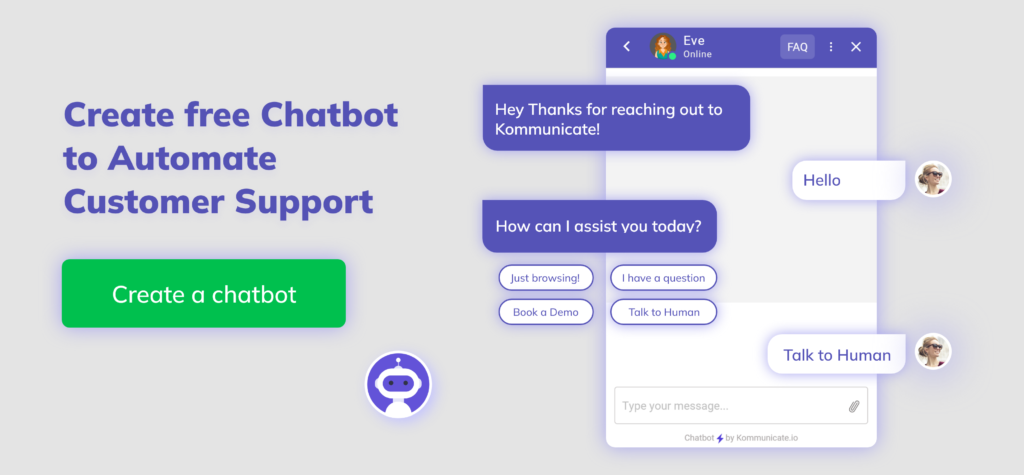
FAQ Chatbot: Use cases and applications
In addition to customer service, FAQ chatbots have diverse use cases as well. Let’s discuss some of these in detail:
1. Sales and Lead Generation
- Proactive engagement: Chatbots can greet website visitors, answer basic product questions, and guide users through their purchase journey.
- Lead qualification: They can gather surface-level customer data to qualify leads before handing them to sales.
- Abandoned cart rescue: Remind customers about forgotten items in their carts with personalized nudges.
2. Marketing and Information Hub
- Promote new products and services: Announce exciting news and answer questions about new offerings, driving awareness and engagement.
- Gather valuable data: Analyze user interactions and collect feedback to tailor your marketing strategies and improve customer understanding.
- Educational resource: Provide educational content and product tutorials, empowering customers and building brand trust.
3. Internal Operations Optimizer
- HR support: Answer employee FAQs about benefits, policies, and payroll, reducing HR workload and streamlining processes.
- IT assistance: Walk employees through basic troubleshooting steps or direct them to relevant IT resources, improving productivity and resolving simple issues quickly.
- Internal knowledge base: Store and access company information efficiently, making it readily available to employees at their fingertips.
4. Global Reach and Accessibility
- Multilingual capabilities: Provide customers with the facility to converse in their native language, removing language barriers while expanding the global reach of your business.
Conclusion
Whether FAQ chatbots offer value to your business website and mobile app hinges on your specific needs and goals. While not a universally perfect solution, they can provide a significant return on investment in many scenarios.
Frequently Asked Questions
1. How do you automate FAQs?
There are three main ways to automate FAQs (frequently asked questions) with chatbots:
- Using rule-based systems
- Deploying Machine Learning (ML) Models
- Taking a hybrid approach involving both of the above methods
2. How to create output for FAQ chatbots?
- Start with the most common questions: Identify the top 20% of your FAQs and prioritize automating those first.
- Keep it simple: Avoid complicated answer structures and focus on clear, concise responses.
- Provide human handoff: Allow users to connect with a live agent if the chatbot can’t resolve their issue.
- Monitor and update: Regularly analyze user interactions and update your FAQs and chatbot training data to ensure accuracy and effectiveness.
3. What is the best tool to create a FAQ?
There’s no one-size-fits-all answer to the “best” FAQ tool, as it largely depends on your specific needs and budget. However, I can certainly suggest Kommunicate as a strong contender, and highlight some other options and factors to consider when making your decision:
- User-friendly interface: A low-code interface that makes it easy to create and manage your FAQs.
- Multi-channel support: Support to embed your FAQs into websites, mobile apps, or social media channels.
- Analytics and reporting: Get a real-time pulse of user engagement with FAQs.
- AI-powered search: Users can quickly find the answers they need with smart search functionality.
- Team collaboration: Multiple team members can work on your FAQs together.
Naveen is an accomplished senior content writer with a flair for crafting compelling and engaging content. With over 8 years of experience in the field, he has honed his skills in creating high-quality content across various industries and platforms.

![What is Conversational Intelligence [Benefits + Features] cover image of conversational intelligence.](https://www.kommunicate.io/blog/wp-content/uploads/2025/04/Featured-Images-1-1-1.avif)
